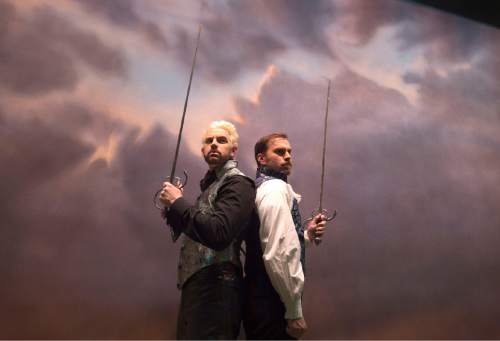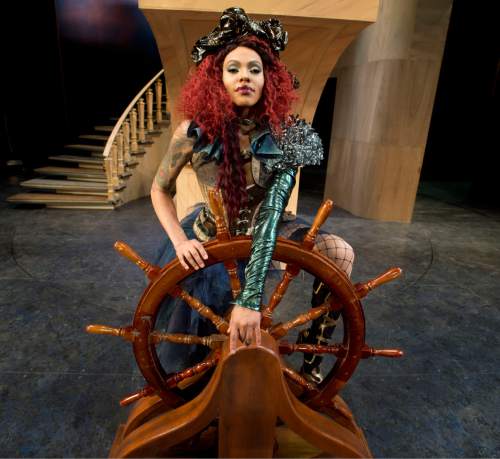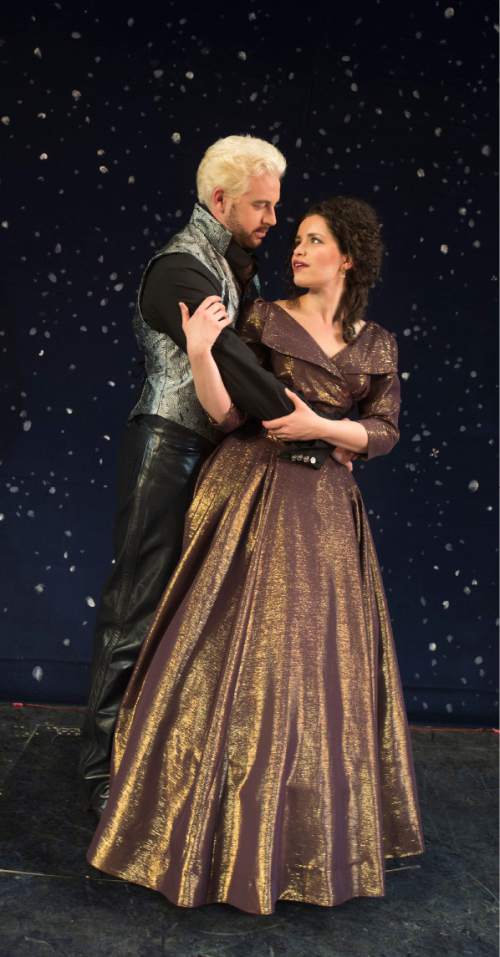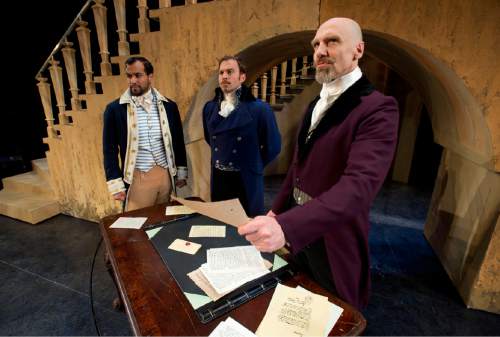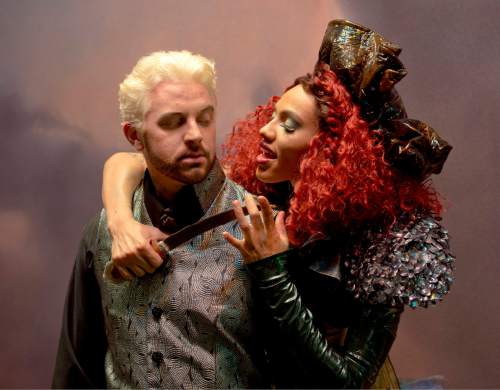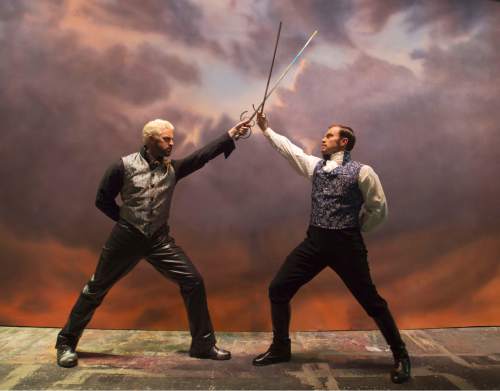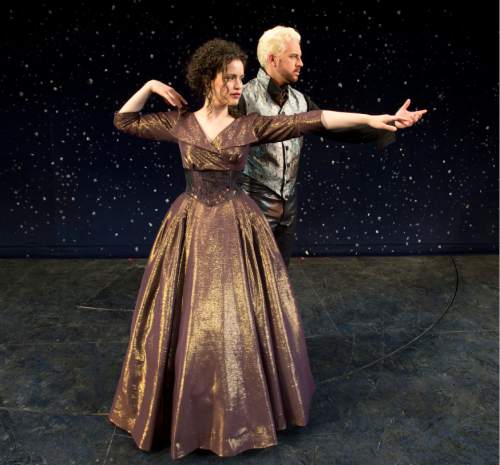This is an archived article that was published on sltrib.com in 2016, and information in the article may be outdated. It is provided only for personal research purposes and may not be reprinted.
The bigger-than-life story of "The Count of Monte Cristo" will open at Pioneer Theatre Company on Friday, May 6, but first there's a little costume problem. The open robe sleeves of the pirates — known as the "Masked Revelers" — keep catching sword blades during a run-through of the musical's "Fake Fight" scene.
Figuring out how to tweak the length of sleeves and robe hems is one of the aims of this rehearsal under the eye of fight choreographer Christopher DuVal and director Marcia Milgrom Dodge.
DuVal adjusts the actors' pacing and calls for eye contact in a fight that requires Matt Farcher, who plays the title role, to ward off attackers by wielding swords in each hand.
"This story is insanely epic," says Farcher, who plays young Edmund Dantes as well as his secret alter ego, the mysterious Count of Monte Cristo. The core of the musical is his character's star-crossed love with Mercedes, played by Briana Carlson-Goodman.
The musical is a "well-made romantic adventure story," says Dodge, underscoring the show's swashbuckling swordfights, which, against theatrical conventions, also include female fighters. "I keep on trying to hint that maybe Mercedes should get to come in at some point," Carlson-Goodman says with a laugh.
The story is about revenge, redemption and love, "and people have been writing about those themes for ages," says Frank Wildhorn, a Tony Award-nominated composer who wrote the score for "Monte Cristo" along with lyricist Jack Murphy. "Hopefully, I'm writing some tunes that people will like."
"Monte Cristo" tells what happens after Edmund and Mercedes fall in love. Edmund is ripped from his wedding bed by evildoers, framed for crimes he didn't commit, then thrown into prison. Years go by, and he learns about redemption from a fellow prisoner. After Edmund escapes from prison, he uncovers a secret fortune, then disguises himself as The Count to seek vengeance.
After premiering in Switzerland in 2009, the musical has continued to be wildly popular in Europe and Asia. But for this Salt Lake City production, billed as the show's American professional theater premiere, Wildhorn and Murphy have continued to write new music and tweak scenic transitions.
"Historically, my shows are always in a constant state of change. It keeps the story alive, keeps it new," says Wildhorn, adding that he came to theater from the publishing side of the pop music business. One of his biggest international hits was Whitney Houston's "Where Do Broken Hearts Go."
The composer attended the first week of PTC rehearsals, where one question prompted him to walk over to the piano and bang out a new tune. "He's totally game," says Dodge, a PTC guest director who received a 2010 Tony nomination for directing Broadway's "Ragtime." "Everything that is going on in this production is the Pioneer Theatre draft. That's thrilling."
Just before this phone interview, 11 days before opening, Wildhorn says he had delivered more pages of new music to Dodge. "I handed it to them a couple of hours ago, and they are working on it right now," he says.
For Wildhorn, the PTC production is just another step in his ongoing courtship with Utah audiences, who have flocked to concerts of his music at Brigham Young University, as well as community theater productions of his shows, including "The Civil War," "Jekyll & Hyde" and "The Scarlet Pimpernel."
His relationships with Utah actors and producers, such as PTC's artistic director Karen Azenberg, keep him bringing his work back to town. "There seems to be wonderful chemistry between the audiences there and my music that you just can't plan on," says Wildhorn, who workshopped "Monte Cristo" in a student production at BYU last year. "Utah has become a wonderful place to work on my material."
Wildhorn says his style of musicals — big, melodic costume dramas — isn't currently in favor on Broadway. That's in contrast to 1999, when he had three shows playing on the Great White Way, and his shows received multiple Tony nominations.
Instead, he now has nearly two dozen shows playing internationally. When the time or theater is right, he hopes most of those shows will be transported home for American audiences.
For this premiere of "Monte Cristo," Dodge praises the artistic team, from music director Michael Sebastian's beautiful weaves of musical themes, to Paul Miller's painterly light design, to Michael Schweikardt's conceptual set design, inspired by the grand staircase of the Paris Opera House.
Another visual attraction will be the contemporary edge of Angela Wendt's costumes, which include pirate styles with a "sea grunge" look. (Wendt is noted for designing costumes for Broadway's "Rent.") "Nobody's wearing mutton chops and old-fashioned hair," Dodge says. "It's all going to feel like a hip, more high-fashion interpretation of this 19th-century world."
For all of the artistic firepower behind this production, the basic task of translating Alexandre Dumas' overstuffed 1844 novel into a two-hour stage musical wasn't an easy theatrical feat. Perhaps it could be compared to the challenge of swordfighting with both hands, which brings us back to Farcher.
The actor says it's helpful that he's left-handed, and also that he spent his youth playing sports. He discovered acting in high school after his older sister and younger brother persuaded him to perform with them in musicals, which is when he discovered that he had what he calls a "decent voice."
"I had a natural timbre and vibrato, which was a gift versus a learned skill," he says. "I was very lucky and got in the hands of good teachers and kept going."
Dodge labels Farcher's voice as "glorious" for his ability to express pain and joy and complication. That glorious voice earned him the lead role at 25, despite his relative youth for the part.
"He has an openness and a freeness and an ease that's combined with strength, and that's very rare to find in strong male voices," says Carlson-Goodman, who plays Mercedes, Edmund Dantes' great love.
She played Eponine on Broadway as well as in the 25th-anniversary touring production of "Les Misérables," and she draws comparisons between the themes of both stories. In "Monte Cristo," "we are following the journey of this man, who against everything is given a second chance," she says. "We follow him and try to figure out what it means to live anew."
"Emotionally available" is how Farcher describes Carlson-Goodman's voice, and his returned compliment underscores the onstage chemistry the actors are building. "Her voice is the most beautiful thing in the entire world, so I have to try to not just stand there and listen to her," he says. "She sings from her heart, and it's not about hitting a money note. She follows the music so instinctively."
facebook.com/ellen.weist —
'The Count of Monte Cristo'
Pioneer Theatre Company presents a stage adaptation of Alexandre Dumas' classic swashbuckling story, with music by Frank Wildhorn and lyrics by Jack Murphy.
The artistic team includes director Marcia Milgrom Dodge, musical director Michael Sebastian, musical supervisor Kim Scharnberg, scenic design by Michael Schweikardt, costume design by Angela Wendt, lighting design by Paul Miller, sound design by Joshua C. Hight, hair and makeup design by Amanda French and fight choreography by Christopher DuVal.
When • Friday, May 6-21 (except Sundays); 7:30 p.m. Monday-Thursday; 8 p.m. Friday-Saturday; 2 p.m. Saturday matinees
Where • Simmons Pioneer Memorial Theatre, 300 S. 1400 East, Salt Lake City
Tickets • $40-$62; $5 more day of show; K-12 student tickets are half price on Monday and Tuesday; at 801-581-6961 or pioneertheatre.org


